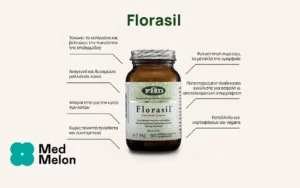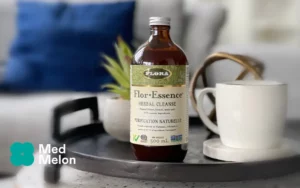Natural Sources OF Phytoestrogens: Red clover (Trifolium pratense L.); Licorice root (Glycyrrhiza glabra L.); Soybean (Glycine max (L.) Merrill) [Fam. Leguminaceae]; Sheep sorrel (Rumex acetosella L. [Fam. Polygonaceae]); Flaxseed (Linum usitatissimum L. [Fam. Linaceae]); and many other foods and herbs.
Forms:
Standardized Isoflavonoid Extracts (i.e. red clover, licorice and soy); Standardized Lignan Extracts (i.e. flax seed lignans); dried whole blossoms, leaves and roots (for teas); Whole or ground flaxseed products.
Therapeutic Uses:
– Acne
– Addiction (alleviates cravings)
– Allergies
– Anti-inflammatory
– Antioxidant
– Bone and Joint Health
– Canker Sores
– Cellular Regeneration
– Cleansing
– Detoxifying
– Eczema
– Endometriosis
– Endotoxic Shock (infection-related toxemia)
– Fibroids
– Headaches
– Hepatitis
– Hormone Imbalances
– Hot Flashes (red clover phytoestrogens)
– Joint Pain
– Menopausal Problems
– Osteoporosis
– Poultice
– PMS
– Psoriasis
– Skin Disorders
– Vascular Disorders
Overview:
Phytoestrogens (literally translated as plant-estrogens) are ubiquitous compounds found throughout the plant kingdom that have been an important part of the human diet since time immemorial. Phytoestrogens provide many profound health benefits and are thought by some researchers to be vitamins. There are two main categories of phytoestrogens: isoflavone-type phytoestrogens that occur mostly in legume plants such as red clover, soy, licorice, kudzu and beans (including genistein, daidzein, formononetin and biochanin-A) and the lignan-type phytoestrogens that occur mainly in seed-coats of grains and other plants (including the SDG flax lignan in flaxseed and the arctigenin and arctiin in burdock seed). Judging by myriad research findings, phytoestrogens appear to be essential for normalizing human hormone levels in both men and women, preventing and even reversing menopausal problems and osteoporosis in older women and they also seem to quickly stabilize aggressive abnormal growths. Japanese women who have a diet high in soy foods have one-fifth the incidence of breast cancer as their non-soy-eating counterparts – attributed to the actions of genistein. Menopausal problems are also almost non-existent with diets high in phytoestrogens. Genistein helps to normalize estrogen and progesterone levels and also inhibits the vascularization of abnormal growths (the formation of blood vessels that feed growths). Genistein and daidzein also inhibit estrogen synthesis and have an overall “anti-estrogen” effect (like Tamoxifen but without the side-effects and risks). Soybeans are also beneficial in the prevention of abnormal prostate growths in men. The daidzein in kudzu vine, another legume, has been found to be efficacious for helping people to overcome addictions and counter low blood sugar. Flaxseed lignans have been shown by bona fide research to: 1) prevent the progression of lupus nephritis; 2) prevent the development of childhood-onset diabetes; 3) quickly lower cholesterol; 4) reverse arteriosclerosis; and 5) prevent death from endotoxic shock.
Chemistry:
Isoflavone-type phytoestrogens occur mostly in legume plants such as red clover, soy, licorice, kudzu and beans and these include: genistein, daidzein, formononetin and biochanin-A. The phytoestrogen content of red clover, for instance, varies from 1.0% to 2.5% of dry matter. Lignan-type phytoestrogens occur mainly in seed coats of grains and other plants, such as the SDG flax lignan in flaxseed (2.5% of the seed-coat) and the arctigenin and arctiin in burdock seed. There are numerous other phytoestrogens that occur in the plant world, but these are the main compounds being studied for their beneficial health effects.
Suggested Amount:
Phytoestrogens can be taken with the recommended dosage of 40 to 160 mg of isoflavones daily from legumes and/or one to two tablespoons daily of flaxseed, which contains approximately 2.5% lignans in the seed coat.
Drug Interactions:
Phytoestrogens and other flavonoids have mild blood-thinning properties that are natural and beneficial (blood platelet anti-stickiness effects) and so a reduced dosage of blood-thinning drugs (such as Coumadin [warfarin], heparin, Trental [pentoxifylline], or even aspirin) may be required with the use of phytoestrogen products. These drugs should only be used in combination with phytoestrogen extracts under a physician’s supervision.
Based on studies with soy, red clover extracts at dosages of up to 160mg/day of phytoestrogens, should not interfere with prescription hormone replacement drugs such as ERT or HRT products (i.e. Premarin) (Scambia et al. 2000). However, until further research is done, it is best to consult your health care practitioner in this case. It is thought that concentrated phytoestrogen products may also interfere with the effectiveness of birth control pills; however, one study with 40 women suggests that this worry is unfounded (Martini et al. 1999).
Potential Positive Interaction:
Phytoestrogens counteract the potential negative effects of Hormone Replacement Therapy (HRT) drugs and other sources of synthetic estrogens, and based on controlled studies with soy phytoestrogen extracts, this will not reduce the therapeutic effects of these drugs. Alternatively, Natural Hormone Replacement (NRT) drugs (based on estriol instead of the more problematic estrogens, estradiol and estrone), available from selected pharmacies in North America such as from Kripps Pharmacy in Vancouver, B.C., are often combined with red clover extracts and are complimented by phytoestrogens.
Contraindications:
None known.
Side Effects:
None known.
References:
Liu J, Burdette JE, Xu H, Gu C, van Breemen RB, Bhat KP, Booth N, Constantinou AI, Pezzuto JM, Fong HH, Farnsworth NR, Bolton JL. 2001. Evaluation of Estrogenic Activity of Plant Extracts for the Potential Treatment of Menopausal Symptoms. J Agric Food Chem 2001 May 21; 49(5): 2472-2479.
Scambia G, Mango D, Signorile PG, et al. Clinical effects of a standardized soy extract in postmenopausal women: a pilot study. Menopause. 2000; 7: 105-111.
Stephens FO. 1997b. Phytoestrogens and prostate cancer: possible preventive role. Med J Aust 167 (3): 138-140.
Wahlquist ML, and Dalais FS. 1997. Phytoestrogens: emerging multifaceted plant compounds. Med J Aust 167 (3): 199-120.
Zava DT, Dollbaum CM, and Blen M. 1998. Estrogen and progestin bioactivity of foods, herbs and spices. Proc Soc Exp Biol Med 217 (3): 369-378.
Additional Information:
Phytoestrogen Actions Summarized:
Research is showing that phytoestrogens are beneficial for preventing and treating many of the major degenerative diseases plaguing our society today. Phytoestrogens support good health in many ways such as: 1) they bind at estrogen receptors and prevent the body from over-producing estradiol; 2) they dilute xenoestrogen-type toxins (synthetic estrogen mimickers like pesticides and plastic compounds) by binding at estrogen receptor sites and functioning as anti-estrogens; 3) they boost progesterone expression and help to normalize the body’s important estrogen to progesterone ratio; 4) they reduce cholesterol and support the liver in its critical role of detoxifying the blood and converting excess estradiol into the more benign form of estriol; 6) they are powerful antioxidants; 7) they prevent the formation of new blood vessels that feed abnormal cells; 8) they inhibit abnormal cell growth, and 9) they boost several beneficial enzymes within the body that prevent DNA adducts and reduce cellular damage and aging.
Positive Clinical Findings:
Based on human, placebo controlled clinical trials, taking 50g of flaxseed/day in four flax muffins brings a 9.8% reduction in LDL cholesterol and 19.8% reduction in Lp(a) within three weeks. For this purpose, flaxseeds must be ground up first, because if they are eaten whole, they will not be digested and will pass right through the digestive tract.
Current News on Phytoestrogen Research – Tuesday, 9 April 2002
Phenoxodiol stabilizes cancer progression with minimal toxicity
(San Francisco, California, USA) – Preliminary US clinical trial results of the novel anti-cancer drug phenoxodiol indicate that it slowed cancer progression in six out of ten patients at doses that were well tolerated. (Phenoxodiol is a synthetic compound based on a natural phytoestrogen metabolite from red clover produced within the human intestinal tract after taking red clover isoflavonoids).
The interim trial results were presented today at the 93rd annual meeting of the American Association for Cancer Research (AACR), in San Francisco, by researchers from the Cleveland Clinic’s Taussig Cancer Centre, in Ohio, one of the leading cancer treatment centres in the US.
Phenoxodiol represents a new direction for anti-cancer therapy. The drug targets the underlying control mechanism in cells that determine whether a cell will survive or die.
This mechanism malfunctions in cancer cells, preventing them from dying or being killed by drugs. Phenoxodiol targets the activities of key members of this control mechanism including sphingosine kinase and the caspase proteins.
Patients on the trial have a variety of cancers that have failed to respond to standard anti-cancer drugs. In the Cleveland trial, phenoxodiol is administered by intravenous infusion for six weeks in the first instance.
Treatment can be continued past six weeks if there is no evidence of tumour progression or serious toxicity. Six of ten patients remained on phenoxodiol beyond six weeks following evidence of stabilisation of the cancer.
The trial’s co-investigator, Dr Thomas Hutson said phenoxodiol was an interesting new drug.
“It may target certain proteins in cancer cells that could be the key to the cancer process,” Dr Hutson said.
Dr Ronald Bukowski, the Director of Experimental Therapeutics in the Cleveland Clinic Taussig Cancer Centre, said that Phase I clinical trials are mainly about evaluating the safety of new drugs and how to use those drugs, rather than about whether or not the drug works.
“Nevertheless, we are encouraged that phenoxodiol appears to have stabilised tumour growth in six out of the ten first patients that were tested on the drug and that the drug was reasonably well tolerated.” Dr Bukowski said.
The cancer types represented by the patients on the trial include colon cancer, melanoma, thymic cancer, prostate cancer, RCC and TCC.
Toxicity included moderate nausea, fatigue and shortness of breath.
Current News on Red Clover Phytoestrogens for Treating Cancer:
One ongoing human clinical trial with a low dosage of phenoxodiol (a synthetic compound based on a natural phytoestrogen metabolite from red clover produced within the human intestinal tract after taking red clover isoflavonoids) has documented an anti-cancer effect, stopping growth of aggressive tumours in 3/17 patients. Given the relatively low dosage of this treatment regime, this is a highly encouraging outcome.
Another trial being conducted in Cleveland, USA, following a similar trial in Sydney, Australia, involves giving the drug by continuous intravenous infusion over 7 days followed by 7 days of rest, and then repeating that at least twice. There are currently 10 patients on this study, with six already showing stabilization of aggressively growing tumours. This trial has received expedition from the FDA to now allow higher doses to be administered to cancer patients sooner than would have been the case under the previous protocol.
The patients in these three trials have advanced cancers across a broad range, excluding leukaemias. The tumours that have responded to phenoxodiol in these trials represent many types including melanoma, pancreatic cancer, renal cancer, adenocarcinoma, and prostate carcinoma.
Recent Red Clover News (Monday, February 11, 2002)
A standardized red clover isoflavone dietary supplement inhibits growth of prostate cancer cells in human trial. New human clinical trial data has revealed that a red clover isoflavone supplement for men causes early stage prostate cancer cells to die in numbers five times larger than in an untreated control group. The trial data was presented at the Third World Congress on the Ageing Male, in the German capital Berlin, by researchers from Monash University’s Centre for Urological Research. The intervention study of 38 patients was designed to determine the effects of red clover isoflavones, in the form of a dietary supplement, on men with confirmed prostate cancer. Prior to prostate surgery, a dose of 160 mg of red clover isoflavones per day was administered to the treatment group until the time of surgery for each patient. Treatment periods ranged from approximately one to eight weeks. The data was compared with a control arm of patients who received no treatment.
Flax News – Positive Clinical Findings:
Researchers Find Flaxseed Can Slow Tumour Growth in Breast Cancer Patients
(CP) – A muffin a day – with 50 grams of ground flaxseed – could keep breast cancer at bay, according to a new Canadian study. The researchers found there was a “slowing down in tumour growth” in breast cancer patients fed flaxseed muffins.
“Our results are very exciting because this is the first time anyone has demonstrated these changes in breast cancer with any dietary component,” said Dr. Paul Goss, director of the breast cancer prevention program at Princess Margaret Hospital and the Toronto Hospital.
Earlier animal studies have shown that flaxseed has anti-cancer properties, but the researchers were surprised by how potent the effect appears to be in people.
“It encourages us to believe this is a very significant biological effect in women and we are heading towards more definitive proof that dietary flaxseed may prevent breast cancer,” Goss said.
Goss presented his research team’s finding on Wednesday at an international breast cancer conference in San Antonio, Tex.
The study involved 50 women who had been recently diagnosed with breast cancer. While waiting for their surgery, the women were divided into two groups. One group received a daily muffin containing 50 grams of ground flaxseed, about 30 milliliters (two tablespoons). The others were prescribed ordinary muffins. When their tumours were removed – usually within 40 days of diagnosis – the researchers examined them for signs of how fast the cancer cells had been growing.
It turned out that the women who had received the flaxseed muffins had slower-growing tumours than the others. Goss noted that more studies are needed to determine flaxseed’s true effectiveness.
Phytoestrogen Safety Expressed Poetically:
Beans, Genes & Genistein
by Dr. James Duke, 1997
Chemophobia, I call it, synthetic fears
Tamoxiphen’s with us some twenty years
Only three years for raloxifene
But our genes long know the genistein!
Maybe some three million years,
Back when Homo (the genus) appears;
Primates grazin the Rift Valley green;
Long they’ve known the genistein!
If my love had breast cancer genes,
I’d rather she took a bowl of beans;
Something that her genes have seen;
They’ve never seen raloxifene!
Angio and Endostatin. miracle cures?
Will kure kancer, Kolata assures
Stop angiogenesis, stopping the cancer,
But genistein’s a cheaper answer
Mom and dad were really kinda funny
Corn bread, cabbage, greens and beans
They didn’t leave me a whole lot of money
But a gracious plenty of well worn genes.
First Read on June 14th at the symposium, Comprehensive Cancer Care: Center for Mind Body Medicine, Alexandria VA.
Dr. Duke worked for the USDA for over thirty years. He has published many CRC Press books on the chemical constituents of edible and medicinal herbs and has reviewed their therapeutic applications. His newest book, The Green Pharmacy (1997), is a fantastic guide for helping people to overcome disease using herbs and foods. Other great books for healing naturally include: Miracle Cures by Jean Carper (1997); Food Your Miracle Medicine by Jean Carper (1993) and Total Breast Health by Robin Keuneke (1997).




